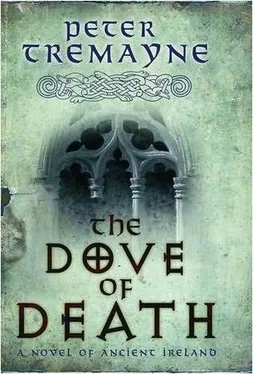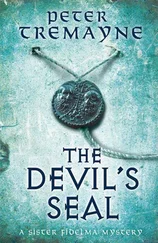Peter Tremayne - The Dove of Death
Здесь есть возможность читать онлайн «Peter Tremayne - The Dove of Death» весь текст электронной книги совершенно бесплатно (целиком полную версию без сокращений). В некоторых случаях можно слушать аудио, скачать через торрент в формате fb2 и присутствует краткое содержание. Жанр: Исторический детектив, на английском языке. Описание произведения, (предисловие) а так же отзывы посетителей доступны на портале библиотеки ЛибКат.
- Название:The Dove of Death
- Автор:
- Жанр:
- Год:неизвестен
- ISBN:нет данных
- Рейтинг книги:5 / 5. Голосов: 1
-
Избранное:Добавить в избранное
- Отзывы:
-
Ваша оценка:
- 100
- 1
- 2
- 3
- 4
- 5
The Dove of Death: краткое содержание, описание и аннотация
Предлагаем к чтению аннотацию, описание, краткое содержание или предисловие (зависит от того, что написал сам автор книги «The Dove of Death»). Если вы не нашли необходимую информацию о книге — напишите в комментариях, мы постараемся отыскать её.
The Dove of Death — читать онлайн бесплатно полную книгу (весь текст) целиком
Ниже представлен текст книги, разбитый по страницам. Система сохранения места последней прочитанной страницы, позволяет с удобством читать онлайн бесплатно книгу «The Dove of Death», без необходимости каждый раз заново искать на чём Вы остановились. Поставьте закладку, и сможете в любой момент перейти на страницу, на которой закончили чтение.
Интервал:
Закладка:
‘I have my beliefs,’ he said slowly. ‘My loyalty is to my Abbot.’
‘And since he is dead? Then to whom?’
‘Whoever is appointed his successor.’
She shook her head in frustration and dismissed him with a wave.
‘Well, my sister from Hibernia, you seem to have strong views.’ Riwanon was regarding her with amusement. ‘Also, it seems that you have an adherence to the old beliefs of your people.’
‘I dislike the idea that one should obey and not question, no matter how extreme the order. I especially dislike it in those who are presumably bestowed with intelligence. In them it is a sin worse than ignorance, for as we often preach, ignorance does not excuse one from responsibility. How can we do this if we teach them to obey without understanding?’
‘You are angry, my sister.’
‘Such things do anger me, Riwanon. Forgive me.’
‘There is nothing to forgive, for I am in accord with you.’ She paused a moment and then said: ‘I suppose we must despatch Brother Ebolbain back to the abbey to inform the community there of what has happened. Perhaps some of the mac’htiern ’s attendants can transport the body of the Abbot back to the abbey for the interment?’
Brother Metellus began to speak and then stopped.
Fidelma turned to look at him enquiringly. ‘You have a thought, Brother Metellus?’
‘I just wondered if I should return with Brother Ebolbain. I am a member of the community. If a new Abbot is to be chosen by the brethren, I would not like the decision to be made precipitately or without an opportunity to express my opinion.’
‘Would they choose one so soon? Should not the obsequies for Abbot Maelcar be conducted first?’ queried Eadulf.
Brother Metellus pulled a cynical face.
‘Abbot Maelcar gathered around him some, like Brother Ebolbain, who might be panicked into a wrong choice.’
Riwanon now intervened.
‘Brother Metellus is correct that he should return to the abbey. To be honest, Brother Ebolbain does not seem a person who is able to present himself in a leadership role, and that is probably what is needed at this time. The community will be shocked and fearful. Brother Metellus here has the strength of character that is needed to guide them.’ It was a statement without guile or any hint of flattery. ‘I am sure that if a guide or interpreter are needed for you and Brother Eadulf, we can find someone to replace Brother Metellus in this role.’
Fidelma was, in fact, reluctant to see Brother Metellus leave, for his knowledge of the area was invaluable. But she found herself assenting. As most people seemed to speak a form of Latin as well as their own tongue, she was not worried on that account.
‘You are right, Riwanon. I am too selfish in this matter. Of course, I agree that Brother Metellus should go to the abbey.’
Brother Metellus smiled at her and Eadulf.
‘I will see you again soon. You will be waiting here for King Alain, no doubt. I may well return before his arrival.’
After he had left, Riwanon excused herself to accompany her female attendants in a walk in the grounds while Budic muttered something about attending to the horses and also left.
‘What now?’ Eadulf asked Fidelma.
‘I am going to have a further word with Iuna,’ she said and, as Eadulf made a movement to join her, she added: ‘You stay here. I think she might be more amenable to my questions without a witness. I want to challenge her about the subject of that argument with Abbot Maelcar.’
‘As you wish,’ Eadulf replied. ‘Though I cannot see her revealing anything more than she has already.’
‘You do not know how revealing someone can be when they do not wish to answer questions,’ Fidelma replied dryly, then turned and went through the door that led into the kitchens.
Eadulf lowered himself into one of the comfortable chairs by the fire with a deep sigh of relief. He turned matters over in his mind and came to the conclusion that, while he had been in worse situations, none had made him so uneasy. Was it being in an unfamiliar country whose language he did not speak, whose laws he did not know, which, combined with the mysteries with which they were faced, made things seem so malevolent and threatening? Sea-raiders…well, he certainly knew about them from the stories he had heard in Seaxmund’s Ham, where he had been brought up. The sea was nearby — the very shores across which raiders had come to plunder or to settle since time began, including his own people only a few centuries before.
He was saddened for Fidelma’s loss of her cousin and her friend Murchad, the captain of the Barnacle Goose . But such things happened. It was a part of life, and life was brutal. Attacks on merchants and their goods — that, too, he knew about. And the murder of abbots was not unknown: Eadulf had been with Fidelma enough times when they had to investigate the untimely deaths of prelates. So what was the cause of the dark threatening atmosphere that seemed to be oppressing him? He had just settled to his analysis when the door through which Fidelma had vanished a few moments before, burst open and she stood there, flushed and slightly breathless.
‘Eadulf, come quickly.’
He sprang up and went towards her.
‘What is it?’ he demanded. ‘What is the matter?’
‘I have just seen Iuna in animated argument with Iarnbud and they have left the fortress,’ she replied, motioning him to follow her. ‘I want to know where they are going.’
‘Iuna and the old pagan? I didn’t think she liked the old man.’
‘Come. They are moving so fast, they might disappear before we catch up with them.’
Eadulf did not protest further but ran with her through the kitchens, ignoring the puzzled glances of those servants who were busy about their duties, preparing the food for the day.
Fidelma led the way to some storage rooms and halted before a door.
‘I could not find Iuna,’ she explained, opening it, ‘so I asked one of the kitchenmaids where she was and was told she was in here. When I came here, the door was open and I heard raised voices. She and Iarnbud were quarrelling. A door was slammed shut on the far side of the room. I waited a moment and went in. The door led out onto the cliffs, and the two of them were moving together down the path towards the shore. So I came back to find you.’
As she was speaking, she and Eadulf went through a storage area to another door. It was a sturdy one with bolts and chains on the interior which, of course, had not been secured.
This door, Eadulf found, as Fidelma had told him, opened beyond the fortress walls to where a path led through an area of thick bushes and trees, steeply downward towards the shore of the Morbihan. It was a well-trodden path and they were able to move quickly down it. The salt tang of water was immediate, and within a few moments they had come to a small inlet surrounded by rocks where waves lapped noisily against them and where several wooden boats bumped against each other with a hollow thudding noise. Eadulf realised that the other side of the rocks to their right must be the stretch of sandy shore where Fidelma had nearly come to disaster in the quicksand.
Rocky steps had been carved on the more precipitous part of the incline that had ended in a natural harbour. There seemed no one in the vicinity.
Fidelma halted, peering around in frustration.
‘This is a means of supplying the fortress from the sea,’ Eadulf commented, ‘but it presents a weak point in times of war.’
But Fidelma was not interested in his martial views. She was looking for some sign of Iuna and Iarnbud. Then she noticed a sail some way out on the glinting waters before them. It seemed to be heading in the direction of one of the islands.
Читать дальшеИнтервал:
Закладка:
Похожие книги на «The Dove of Death»
Представляем Вашему вниманию похожие книги на «The Dove of Death» списком для выбора. Мы отобрали схожую по названию и смыслу литературу в надежде предоставить читателям больше вариантов отыскать новые, интересные, ещё непрочитанные произведения.
Обсуждение, отзывы о книге «The Dove of Death» и просто собственные мнения читателей. Оставьте ваши комментарии, напишите, что Вы думаете о произведении, его смысле или главных героях. Укажите что конкретно понравилось, а что нет, и почему Вы так считаете.











